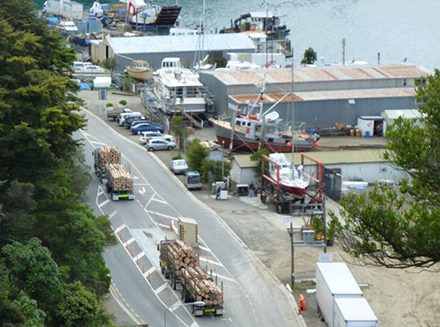
This month, more than 40 logging trucks and their drivers rallied alongside the CFMEU in a fight for the survival of the Heyfield Mill in Victoria.
A strong visual reminder of the role trucking plays in any industry, it’s clear the potential closure of the Heyfield Mill in a town that’s home to 2000 people goes far deeper than just the end of a single company.
As the current situation stands, access to areas of Central Highlands timber has been restricted due to the presence of the leadbeater’s possum, listed under threatened species status.
Mill owner Australian Sustainable Hardwoods, (ASH) which processes 150,000 cubic metres of timber per annum, has rejected the government’s counter-offer of a three-year contract consisting of close to half the amount of timber and a $4.7million operational subsidy.
As new agreements are debated and possums are surveyed, workers and trucking contractors count down to the end of the existing supply agreement, which expires on June 30, 2017.
But that’s all politics.
For 62-year-old Gerald Conway of G&S Conway, the closure of the Heyfield Mill could mean the end of his working career and family business.
Driving from the age of 18 using a special licence from the police department, the local contractor started moving wood chips in 1978.
“We keep busy on the chip and employ a few people – it’s good work,” he said.
“They keep saying there is going to be 250 people out of a job, but with all those connected there will be thousands out of work.”
Like many of the contractors in town, 100% of his work comes from the mill.
Both his brother and nephew are involved in logging and one of Gerald’s sons, also dependent on the mill, runs three logging trucks that each come with a specialist set-up worth more than $500,000.
“My son just added a Kenworth to his business. It’s going to be a struggle to pay that off if the mill goes down,” he said.
“We have been doing it all our lives and there are some blokes in the bush with a couple of million worth of gear they won’t be able to sell.”
Mr Conway, who was part of the Melbourne protest, said he wasn’t too keen on one of the proposed solutions, which offered to train workers to switch to the tourism industry.
“How many people are they going to take on tours to see this possum?” he sighed.
When asked if he could see himself as a guide, Gerald just laughed.
“I employ four blokes. I figure if they shut the mill, the rest may fold and Heyfield could pull the pin,” he said.
“We’ve done everything all right – our trucks are geared up for carting chips, I have a specific set-up on trailer so we couldn’t resell them.
“May as we’ll take ’em out and put them in the tip.”
Mr Conway said he felt for others he knew who had bank debts they may be unable to pay off.
“It’s just a bit hard at the moment. You can’t spend any money doing anything because you don’t know what is next,” he said.
“I know blokes who may lose their house and don’t know how to do anything else, some who can’t get another job at that age.”
Australian Sustainable Hardwoods chief executive Vince Hurley said there were dozens of trucks involved and reliant on the day-to-day running of the Heyfield Mill.
“We have many trucks that will be impacted – log trucks carting into us, which is around 42,000 B-double loads per annum,” he said.
“There is also a lot of truck movement directly. We need to move stock between the green mill and processing plant, which is about 38,000 normal semi loads a year.
“All of them are private subbies and contractors.”
Chip trucks like Gerald’s do about 1200 loads of chips for the mill per year, alongside 450 loads of sawdust.
Final products like wood goods and timber also call for 15,000 outgoing loads a year.
“The fact is, currently this is a good, profitable mill which makes money and employs people,” Mr Hurley said.
“It is extremely frustrating for everyone. Right now we are waiting for the government to give us some answers.
“Every day in this business we spend money on improvements, so if we are going to continue to operate we need to have some longevity.”
For those involved, it’s this uncertainty causing the most pain.
“This is not a good thing – The sooner we know, the better. People are filled with anxiety. We want to resolve this for our people, suppliers and transporters,” he said.
The amount of viable timber supplies remains in question, the answer dependent on which side of government is asked.
But the impact of the closure – if it happens – is clear: the flow-on effects will be felt by the trucking industry.
Minister for Infrastructure and Transport Darren Chester has stated he is working at a federal level to determine the future of the mill.
“There is no doubt the flow-on effects of the Australian Sustainable Hardwoods sawmill closing would be felt heavily by the heavy vehicle industry,” Minister Chester said.





